In this comprehensive guide, we will delve into the world of best knowledge base software and help you understand why they are an essential asset for any business. We will explore the key features that make an effective knowledge base tool and discuss the different types available. By the end, you will have all the information you need to choose the right knowledge base tool for your specific needs. So, let’s dive in and unlock the power of knowledge base tools.
Understanding Knowledge Base Software
Knowledge base software are powerful platforms that enable businesses to organize, store, and share important information and resources. They act as a centralized hub where employees and customers can access self-help articles, guides, videos, FAQs, and more. Think of it as a treasure trove of knowledge, readily available at your fingertips.
But what exactly are knowledge base software and why are they so important in today’s business landscape?

What is knowledge base software?
Knowledge base tools are software applications or platforms that allow businesses to create and manage a repository of knowledge. Whether it’s creating product information or guides, you can also convert JPG to PDF document to streamline visual content integration into your knowledge base effectively. The tools provide a user-friendly interface that makes it easy for both employees and customers to search for and access the information they need.
These tools typically offer various features such as categorization, tagging, search functionality, and analytics. They allow businesses to structure their knowledge base in a logical and organized manner, making it easier for users to navigate and find the information they are looking for.
Furthermore, knowledge base software often support collaboration and content creation, allowing multiple contributors to add, edit, and update articles. This ensures that the knowledge base remains up-to-date and relevant.
Importance of Knowledge Base Tools in Business
Knowledge base tools are not just a fancy addition; they play a vital role in streamlining business operations. By providing a self-service option, they empower customers to find answers to common queries on their own, reducing the load on your support team. This not only improves customer satisfaction but also frees up your support agents to focus on more complex issues and provide personalized assistance.
Similarly, internal knowledge base tools enhance productivity by enabling employees to access critical information quickly, without the need to reach out to their colleagues or managers. This saves time and eliminates unnecessary interruptions, allowing employees to work more efficiently and autonomously.
Knowledge base software can also serve as a training resource for new employees. They can access the knowledge base to learn about company policies, procedures, and best practices, helping them get up to speed faster and reducing the need for extensive onboarding.
Additionally, knowledge base tools can contribute to knowledge sharing and collaboration within an organization. They provide a platform for employees to share their expertise, insights, and solutions, fostering a culture of continuous learning and improvement.
Knowledge base software can help businesses stay organized and compliant. By centralizing information and resources, they ensure that the latest versions of documents and policies are easily accessible to everyone. This reduces the risk of outdated or conflicting information being circulated within the organization. Businesses can also hire developers to customize and optimize knowledge base software to meet their specific needs.
Key Features of an Effective Knowledge Base Tool
User-Friendly Interface
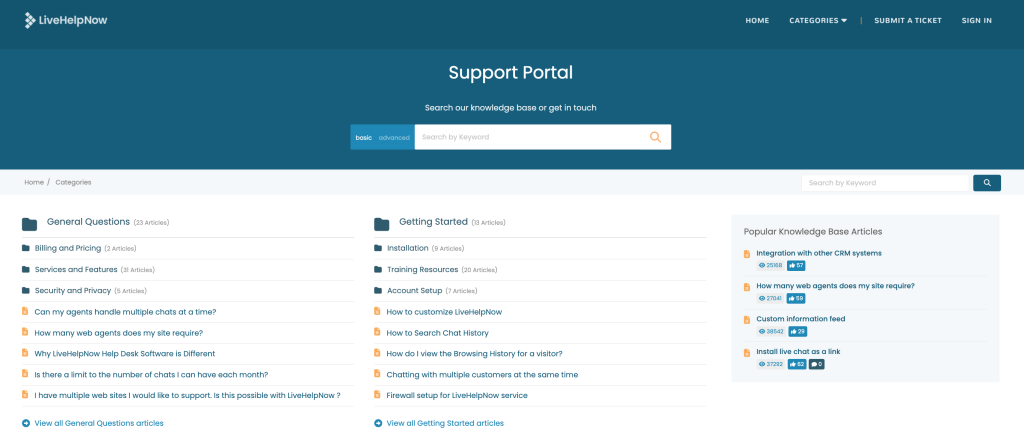
A great knowledge base tool should have a user-friendly interface that makes navigation effortless. It should be intuitive, with a clear structure and easy-to-use search functionality. After all, your knowledge base is only as good as its accessibility.
Advanced Search Capabilities
Imagine a knowledge base tool with a vast amount of information but a poor search function. Frustrating, isn’t it? An effective tool goes beyond simple keyword search and offers advanced search capabilities, such as filters, tags, and boolean operators, to help users quickly find what they need.
Analytics and Reporting
Tracking and analyzing user behavior within your knowledge base is crucial for continuous improvement. Look for a tool that provides detailed analytics and reporting features, allowing you to identify popular topics, customer pain points, and areas that may need more attention.
Multi-Language Capabilities
Multi-language functionality in knowledge base solutions enables seamless content creation and retrieval in diverse languages. Users can access information in their preferred language, enhancing communication and ensuring effective knowledge sharing across global teams, fostering collaboration and efficiency.
Related Read: Multilanguage Knowledge Base Support
AI-Powered Features
Knowledge base integration with AI offers several advantages for businesses. It enhances efficiency by automating processes, enabling faster information retrieval, and improving response times in customer support. AI, such as ChatGPT, can provide personalized assistance, improving user experience and customer satisfaction. Additionally, AI-driven knowledge management systems continuously learn from user interactions, ensuring the information remains up-to-date and relevant. This integration also allows for innovative solutions like chatbots, which can handle routine inquiries, freeing up human resources for more complex tasks.
Choosing the Right Knowledge Base Tool for Your Needs
Assessing Your Business Needs
Before jumping into the sea of tools, it’s vital to assess your business needs and goals. Consider the size of your organization, the nature of your products or services, and the level of support you aim to provide. Knowing your specific requirements will help you narrow down your options and find the perfect fit.
Comparing Different Knowledge Base Software
Once you have a clear understanding of your needs, it’s time to compare different knowledge base tools. Look for trial versions or demos to get hands-on experience and evaluate how well each tool addresses your specific requirements. Pay attention to factors like user reviews, pricing, customer support, and ease of implementation.
Armed with all this information, you are now equipped to make an informed decision and choose the best knowledge base tool for your business. Remember, a well-structured and easily accessible knowledge base can be a game-changer for your organization, enhancing productivity, improving customer satisfaction, and ultimately, boosting your bottom line. So, go ahead and unlock the power of knowledge base tools!
10 Best Knowledge Base Tools for 2024
1. LiveHelpNow
LiveHelpNow is a powerful and scalable web-based customer service suite that transforms static sites into robust and dynamic resources for assisting new and existing customers efficiently and effectively. All the questions customers pose converge in one location, easily accessible both publicly and privately. These queries can be presented in the form of a searchable FAQ that is fully customizable and branded to align with the existing website design. Repeat inquiries are eliminated, brand awareness is heightened, customer satisfaction improves, and support costs decrease with the Knowledge Base System.
The Knowledge Base encompasses all the necessary tools for setting up and maintaining an online support center for customers. Contents and layout of articles can be altered at will without the involvement of a webmaster.
The home page of the Knowledge Base, also referred to as the Support Center, showcases the latest, most popular, and top-rated support articles. As more customers utilize the Knowledge Base, the Support Center becomes more intelligent. Customers can rate articles and leave comments for review, ensuring tha
LiveHelpNow Knowledge Baset the online support solution is consistently optimal. Article ratings are publicly shared, while article comments remain private. Article comments can be reviewed at one’s convenience, allowing for responses with improved FAQ content targeting both potential and existing customers. Informed online shoppers buy with confidence, and returning customers who receive excellent service continue to make purchases – both are significant revenue drivers.
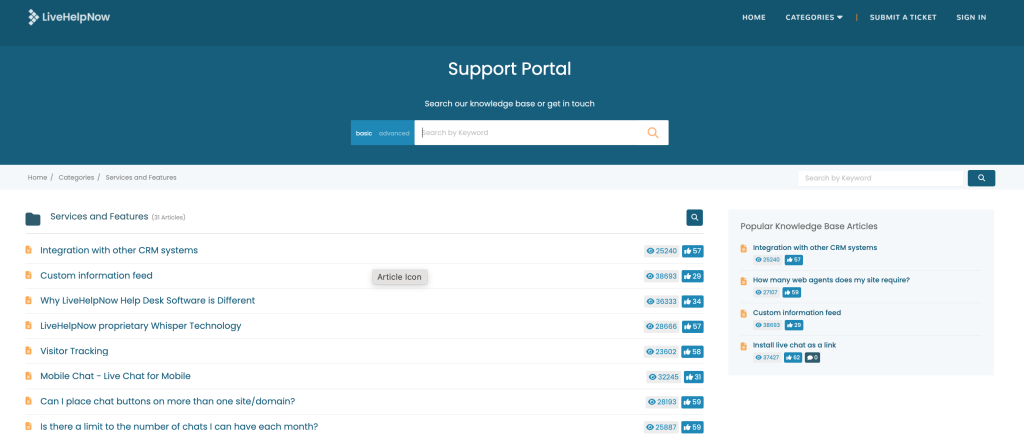
As employees access all the help articles available to customers, it is advisable to provide them with their own resource for internally arising FAQs. Setting up workers for success enables a well-deserved vacation.
2. ZenDesk
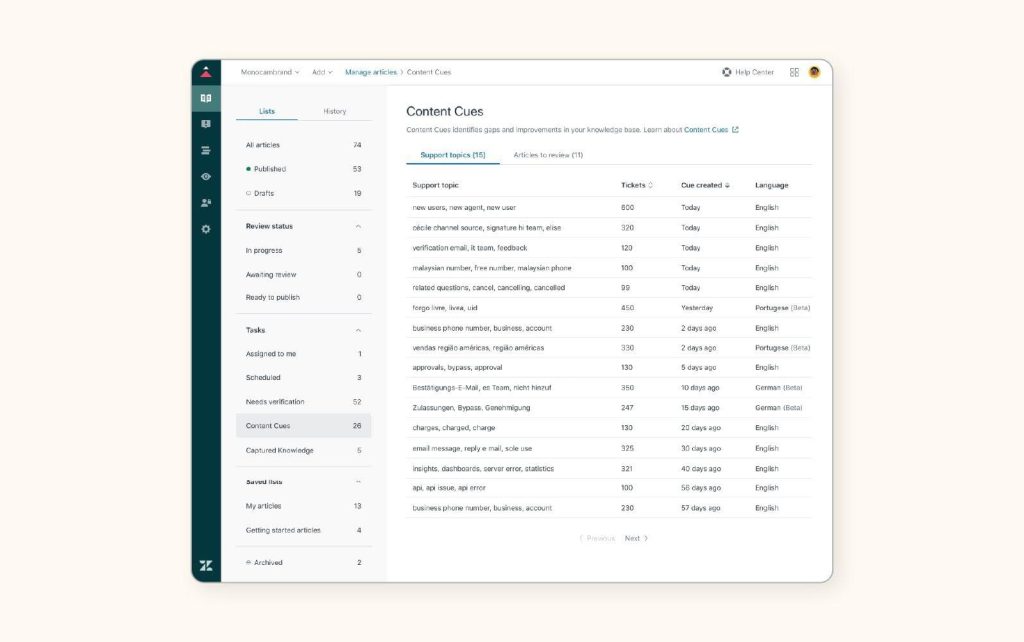
Zendesk offers knowledge base software as part of its customer service suite, allowing teams to manage content, help tickets, internal communication, and more from a centralized place. The software can be utilized internally as an IT knowledge base or agent knowledge base and as a customer-facing FAQ software tool.
The knowledge base software assists in keeping content relevant. Built-in AI-powered tools, such as Content Cues, provide insights into what customers are searching for, suggestions for new knowledge base content to fill knowledge gaps, and prompts to update content in existing articles. Generative AI features are capable of writing new articles, revising existing content, and creating conversational responses during customer interactions.
Managing updates becomes more streamlined with Team Publishing, a collaboration tool that enables teams to build workflows for reviewing, approving, and publishing content. The Content Blocks feature allows the creation and placement of content blocks—text, images, and videos—in relevant articles. These blocks are updated in a single place and automatically reflect changes wherever the content appears.
Zendesk ensures that knowledge management systems are accessible to everyone. Users can create language-specific versions of articles in over 40 languages and build a self-service portal for customers or employees, ensuring that information is always available whenever needed.
3. Guru
Guru’s knowledge base system empowers teams to generate, share, access, and revise information seamlessly. It seamlessly integrates into the team’s existing workflow, consolidating contextually relevant information with tools like chat, email, and the customer relationship management (CRM) system.
Leveraging AI, Guru intelligently surfaces information within the knowledge base, with suggestions improving over time based on patterns from customer and employee searches. The AI functionality extends to suggesting related articles and identifying redundant information to ensure the content remains up-to-date. While Guru primarily serves as an internal knowledge base, its application programming interface (API) allows for the external publication of content.
4. Zoho Desk
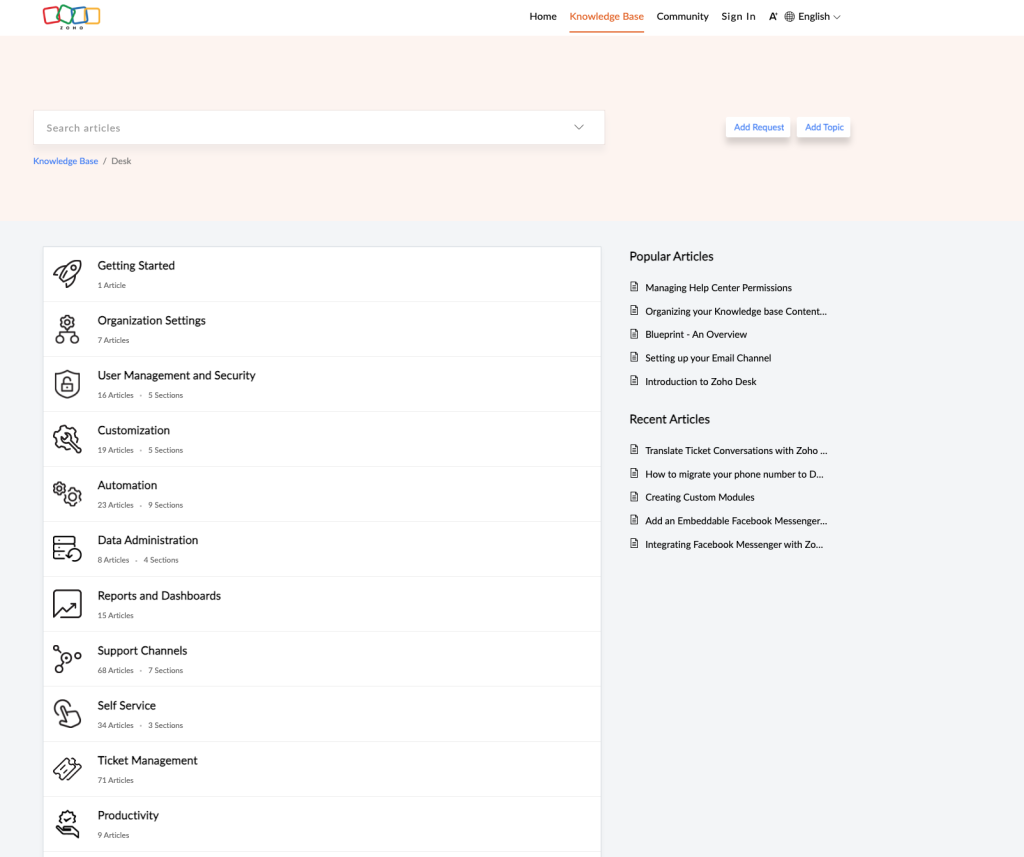
Primarily recognized for its ticketing system and help desk solutions, Zoho Desk includes knowledge base software in its offerings. The adaptable structure enables the creation of distinct categories for how-to articles, FAQs, and various self-service options.
Writers and editors can collaborate effectively using Zoho’s collaboration tools to generate content. Businesses can manage access to their knowledge base by mandating user account creation. Furthermore, Zoho provides users with the flexibility to customize knowledge base themes and branding, incorporating logos and color schemes. The platform also features community forums, fostering customer collaboration and interaction with the team.
“ZohoDesk is great for tracking article views and combining with support tickets for customer support teams. If you’re savvy with html and css you can custom the site pretty well, otherwise there are basic styling options in admin settings for logos and theme colours.” (Reddit User NorthernModernLeper)
5. Document360
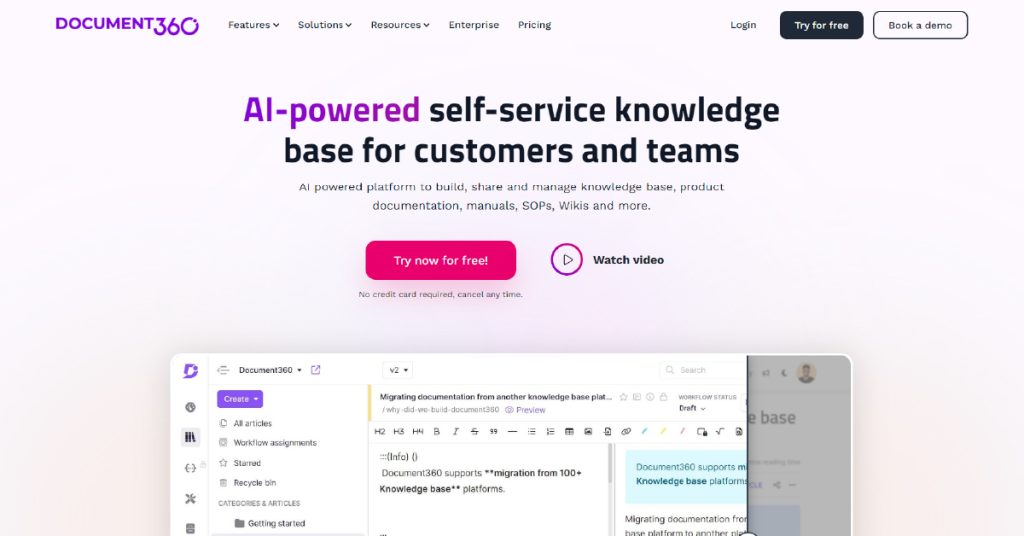
Document360 is a leading knowledge base software designed for efficient online documentation and content management. Offering a user-friendly experience, it enables businesses to create, organize, and maintain knowledge bases seamlessly. With advanced features like AI capabilities, collaborative editing, and powerful workflow management, Document360 streamlines content creation and enhances user experiences.
The platform facilitates easy categorization, replication of articles, content reuse, and comprehensive SEO management. Providing advanced version control, localization, and secure access configurations, Document360 ensures a tailored approach to knowledge base management. Its integration capabilities, API documentation, and backup/restore features contribute to making it a comprehensive solution for businesses seeking optimal content management.
6. Obsidian

Obsidian serves as a personal knowledge base solution with a unique offline approach. Unlike most cloud-based options, its Personal plan stores data locally in markdown format, ensuring easy readability and offline access. Users can work seamlessly even without a stable internet connection. For those desiring cross-device access or public article publishing, Obsidian provides Sync and Publish add-ons with cloud-based functionality and a monthly fee. The Personal plan is free for non-commercial use, while supporters can make a one-time $25 payment for early access to new builds. Commercial licenses cater to businesses with two or more employees, expanding the software’s versatility.
7. Notion

Notion stands out as a prominent player in internal knowledge bases, renowned for its remarkable flexibility. The tool allows users to create diverse elements like kanban boards, checklists, and text documents. It seamlessly combines the features of an internal wiki with those of a project management tool, enabling task assignment and setting due dates for enhanced collaboration. While a free plan is available for personal use, the true value emerges with multiple collaborators, requiring a subscription to the Plus, Business, or Enterprise plans. Pricing starts at $8 per user per month, with a free trial and plan options.
8. Confluence
Confluence shares a striking resemblance with Notion in both appearance and functionality. Tailored for internal use and project management, Confluence boasts an extensive library of page templates for a swift start. The platform allows the creation of team spaces to maintain organization and provides the flexibility to set permissions for various articles. Its seamless integration with other Atlassian products, including Jira and Trello, enhances its appeal, making it an ideal choice for teams already immersed in the Atlassian ecosystem.
9. ClickUp

Team members can effortlessly access the necessary information using ClickUp’s knowledge base, streamlining communication and reducing response time. The centralized Knowledge Base in ClickUp proves vital for maintaining policies, procedures, and compliance. With ClickUp’s Knowledge Base Template, teams can efficiently:
- Establish a searchable knowledge database
- Organize and store critical documents in one location
- Monitor changes to policies or documents over time
This template ensures an organized knowledge repository, aiding in compliance management. Benefits include creating a centralized source accessible to the entire team, keeping members updated, reducing search time, and enhancing information accuracy. ClickUp’s Knowledge Base Template features custom statuses, fields, and views for comprehensive document tracking and management. Teams can start now for efficient workflow improvement.
10. Helpjuice
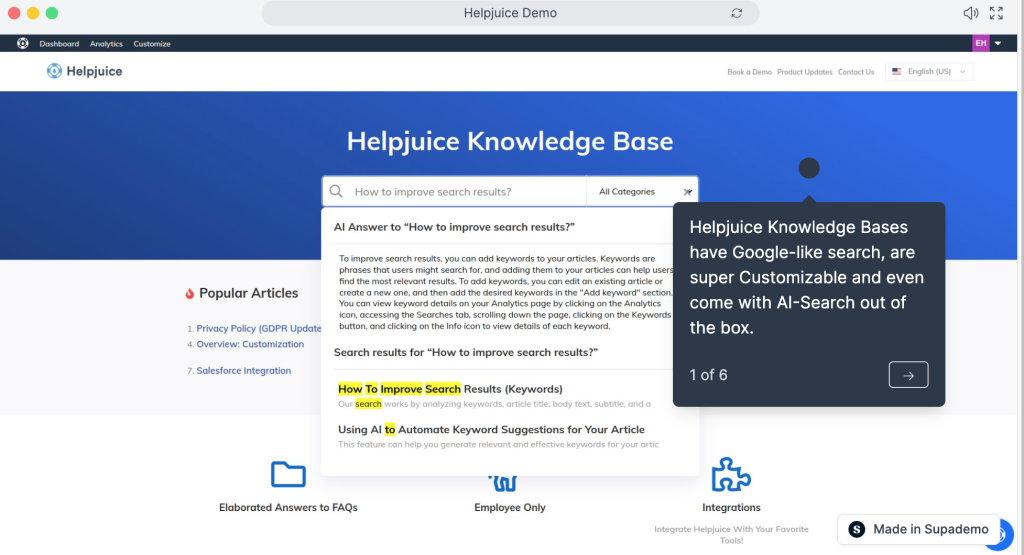
Used by numerous companies, Helpjuice is a free knowledge management software that aids in creating and organizing support articles. With support for multilingual business needs, it offers a range of reporting and analytics options. However, it tends to be pricier compared to other tools. Some key features of Helpjuice include advanced analytics for internal knowledge bases, customizable branding for articles, interactive troubleshooting content, and real-time collaboration with MS Word integration. Pros include powerful search functionality, an easy-to-use editor with WYSIWYG and markdown options, and integration with tools like Slack and Zapier, facilitating collaboration and supporting multiple languages.
11. AiHello

Wondering what is Amazon PPC tool? In simple words, it is a powerful tool to enhance visibility and drive conversions on the platform. With its help, you can get valuable insights to refine your keyword strategy. Aihello Amazon PPC tool facilitates effective keyword research by identifying relevant search terms, analyzing competitor strategies, and ensuring your products are visible to potential customers.



